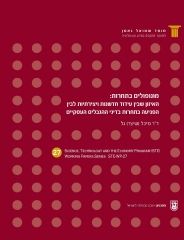What Affects Technion Faculty Members’ Decision to Found a Start-Up Firm? Effects of the Business Opportunity and the Entrepreneur’s (faculty)
While research has recognized the importance of the entrepreneurial opportunity evaluation (EOE) stage in affecting overall entrepreneurship activity, only venture capitalists (VCs) perspectives were explored. No research has attempted to understand the crucial and complementary role of entrepreneurs points of view. In an effort to fill this gap, the current study focuses on the entrepreneur […]
Science and Technology Indicators in Israel: An International Comparison

It is well recognized that human capital, especially in the areas of science and technology, (S&T), is the main growth-enabling resource in Israel. How can this recognition be evaluated in light of the economic and statistical data over time? In this new Neaman Institute study we propose a systematic set of indicators, which can and […]
From Ivory Tower to Industrial Promotion:The Case of Yale University and the Biotechnology Cluster in New Haven, Connecticut, STE-WP-28
In 2001 Ernst & Young ranked the state of Connecticut seventh in the nation with respect to the number of biotech firms operating within its borders relative to its population (Ernst & Young, 2001). In 1993 there were only six such companies in the state. What led to this increase? This case study describes the […]
Start-up funding inefficiencies due to VC’s Limited horizon, STE-WP-29
We study the conflict of interests between limited partners (LPs) and a general partner (GP) in a VC fund with a limited life-span. LPs commit money for investment in risky projects, while the GP selects projects and provides unobservable monitoring effort for each project. We assume that midway into the project, the GP privately observes […]
Evolutionary Innovation and High Tech Policy: What can we Learn from Israel’s Targeting of Venture Capital STE-WP-25
The paper analyzes Israel’s Innovation and High Tech Policy from a Systems-Evolutionary (S/E) and Life Cycle Perspectives with a focusing on the targeting of the Venture Capital Industry during the 1990s. Other related research strongly suggested that the emergence of Venture Capital (VC) during that decade was a central vector in the re-configuration of Israel’s […]
Public vs. Private Technological Incubator Programs: Privatizing the Technological Incubators in Israel STE-WP-26

The Public Technological Incubator Program (PTIP) was initiated in the early nineties by the Office of the Chief Scientist (OCS) in the Ministry of Industry and Trade in Israel in the wake of a large influx of immigrants from the former USSR, many of whom were scientists and engineers. Since the year 2000, private technological […]
Monopolies in Competition:The Balance between Innovativeness and Competition in the Israeli Competition Law STE-WP-27

Law plays an important role in the formation of incentives for the creation as well as the diffusion of intellectual property. Intellectual property laws and competition law are of special importance. Intellectual property laws determine when an inventor is entitled to receive an exclusive right to use his invention. The grant of such a right […]
Conservation of the rural landscape: Implementation model of sustainable agriculture in selected agricultural areas in Israel

Agriculture produces rural landscape, environmental services, cultural and social values in addition to the marketable food and fiber products. The aim of this research is to suggest policy mechanisms to advance the sustainability of agriculture in Israel. This stage of the research focused on the implementation of such mechanisms in specific regions, following a more […]
Firm Growth Profiles (FGPs): Towards an Action-Based View of Firm Development STE-WP-24
The paper presents the concept of the Firm Growth Profile (FGP) which contributes to the creation of a dynamic Resource-Based View theory by explaining how capabilities are developed in path-dependent processes. An FGP represents the pattern of critical actions taken by a firm in different value activities (e.g. R&D, marketing, production and finance) during subsequent […]
Economic assessment of current deposit law and suggested packaging law in Israel

This joint research project, carried out by the Samuel Neaman Institute and ELA- the recycling cooperative, examined the following parameters: Economic costs of the Packaging Law in Israel Implications of expanding the Deposit Law to 1.5 liter bottles Results of the studies indicate that the bottle deposit law in its present form, taking into account […]
